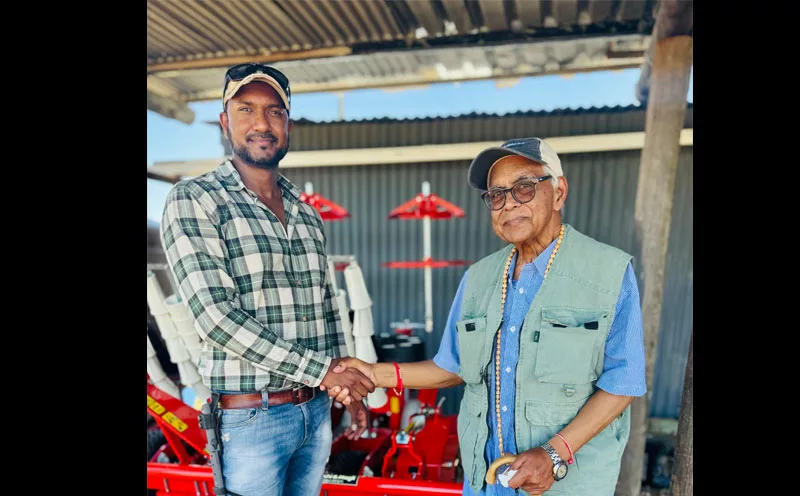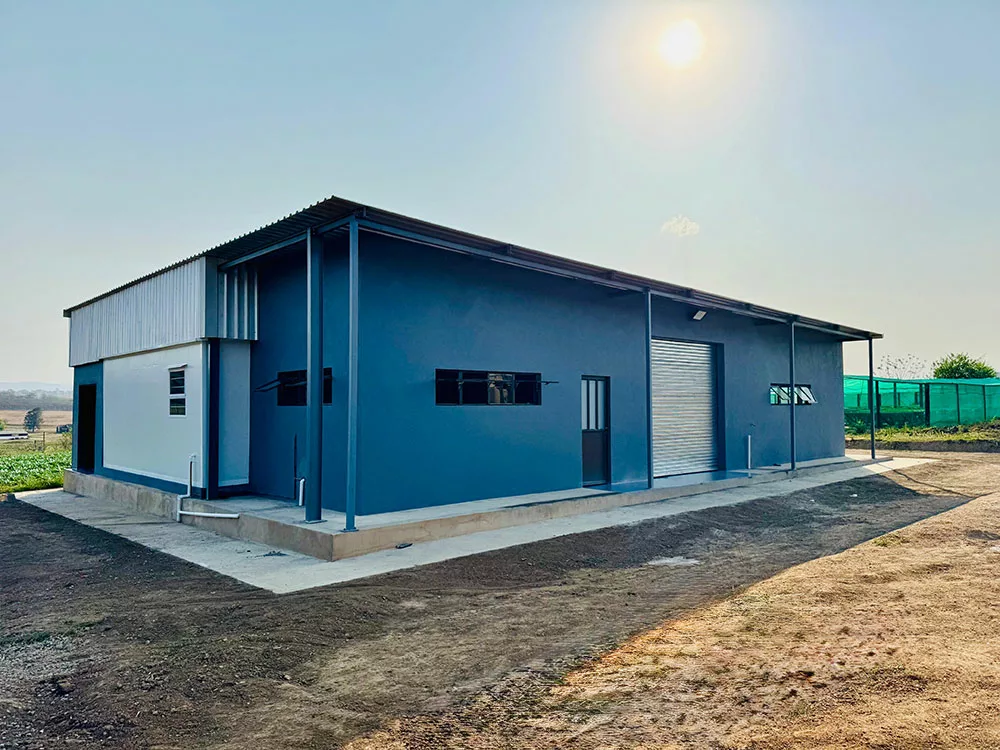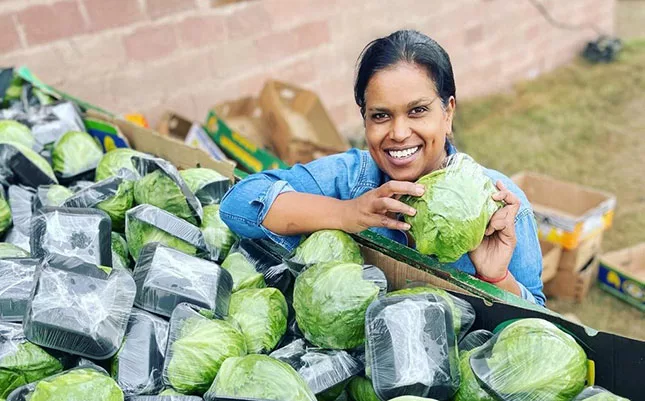Roadway Farms in Albert Falls, KwaZulu-Natal, is implementing a mannequin supposed to maintain the household operation financially viable and sustainable into the longer term. Vegetable farmer and entrepreneur Shakti Satyapal talks about how they’ve reimagined the enterprise lately.
Photograph: Provided
Shakti Satyapal has spent the previous 5 years in a state of transition. This has not solely been a private shift from a company profession to that of a fully-fledged vegetable farmer, but additionally a technique of evolving the ailing household farm right into a profitable enterprise.
Additional to this has been the shift from standard to regenerative farming.
“It has been a chance to take what my father developed over a few years and attempt to construct and enhance on that. The journey has additionally been about attempting to get to an area the place we will present a blueprint to assist different farmers transition to regenerative agriculture,” says Satyapal.

Weathering the proper storm
Satyapal heads up Roadway Farms, the household farming operation, in partnership together with his father, Prakash, and sister, Prishani.
The 26ha farm, the place they produce quite a lot of vegetable crops all year long, is situated on the banks of the Umgeni River alongside the R33 close to Pietermaritzburg in KwaZulu-Natal (KZN).
The farm has been within the household since Satyapal’s father bought it within the Nineteen Nineties.
Though he has been uncovered to agriculture and rural environments all through most of his life, Satyapal solely actually started farming in earnest somewhat greater than 5 years in the past. After ending college, he pursued a profession in promoting and strategic advertising companies, working with main shoppers like SAB and BMW.
He ultimately turned annoyed with the trade and its normal lack of social duty, so in 2013 he joined his sister in an organization she had based known as Sustainability Truthing, specializing in driving sustainability tasks and initiatives.
It was whereas they have been working collectively that the matter of the household farm got here up for dialogue. It was struggling, and Satyapal says his dad had thought of promoting it.
“Each my sister and I mentioned we’d discover a approach to make it work,” he provides.
This occurred in 2019. The next yr, COVID-19 hit, making a near-perfect storm alongside a bunch of different challenges.
“It actually was difficult; it was diabolical. Every part that would go fallacious did,” explains Satyapal.
In that first yr of operations, they have been hit by a world pandemic that resulted in varied restrictions and shortages, with the riots and looting in July 2021 additionally inflicting challenges.
This was exacerbated by battle half a world away, with the tensions between Russia and Ukraine affecting the fee and availability of fertiliser and different chemical inputs like pesticides.
“On prime of that, we had flooding. Now we have had flooding in KZN yearly for the previous 5 years,” he provides.
Floor-up strategy
Regardless of all of those and different hurdles, the household has steadily reworked the farm from a struggling enterprise into one which’s thriving and increasing.
Step one was to step again, scale back manufacturing, and handle infrastructure shortfalls.
Satyapal says the enterprise had already been in a “difficult” state when he took over. This was exacerbated by the macro-geopolitical, financial, and local weather challenges and additional difficult by micro-level points.
“We have been beginning off from a low base. We had issues with infrastructure, tractors that weren’t working, and irrigation pipes that have been in unhealthy form,” he explains.
At this stage, they determined to first scale down manufacturing to handle the systemic points. Satyapal says farming the best way they’d been doing it was too costly, with efforts targeted on prices moderately than income.
“We needed to pause for some time, take a step again from full manufacturing, and reassess [our practices].”
Throughout this era, they invested private capital to pay the payments and enhance infrastructure. This included having spare components engineered for tractors that weren’t working.
This yr and final, they’ve continued to make progress with the assistance of funds from authorities’s Complete Agricultural Assist Programme.
“In a comparatively brief time, we managed to get the tractors sorted out, improve our irrigation methods, recondition our implements, and get the instruments essential to farm extra effectively.
“As soon as the fundamentals have been fastened, our work turned extra environment friendly,” explains Satyapal.
It was additionally throughout this course of that he fell actually, head over heels in love with the work he was doing.
A ardour for meals
When requested what precisely he fell in love with, Satyapal says it was being on the bottom and having the ability to actually perceive how meals was grown.
“It’s innately a part of us. When you perceive this, it actually turns into a part of who you might be.
“[It is about] understanding the standard of meals and your relationship with nature, from the microbes within the soil to the cosmos.”
Satyapal says his total household is keen about meals: “It’s at all times one of the crucial rewarding emotions to get an excellent harvest out.”
READ Pure fertilisers for greens
Talking concerning the greater image, he highlights useful resource preservation, saying many standard agriculture practices are damaging a very powerful useful resource, specifically soil.
“When you take a look at using fertilisers, [other] chemical substances, and monocropping, persevering with these practices will deplete the [soil] to the purpose the place it’s not useable,” he says.
The system he’s introducing on the farm focuses not solely on taking from the soil but additionally on placing again and constructing it up over time. He says soil preservation is vital within the quest to develop meals, with the regeneration of ecosystems taking part in a key function within the greater image.
In shifting in the direction of a extra sustainable future, he provides a sensible instance with fertiliser, saying it’s an enter that’s delicate to world forces which can be past a farmer’s management. At Roadway Farms, they’ve begun transitioning from artificial fertilisers to regionally sourced natural choices.
The subsequent step is to make their very own fertiliser on-farm. Whereas this gained’t occur in a single day, it’s a strategic transfer that additional aligns with their sustainability-based mannequin.
Manufacturing fundamentals
Roadway Farms at present produces spinach and cabbage all year long, in addition to particular summer time and winter greens.
“Winter crops embrace broccoli, cauliflower, lettuce, purple leeks, spring onions, and a few herbs.
“In summer time, we develop okra, chillies, inexperienced beans, dry beans, butternut, some Indian vegetable varieties, brinjals, a summer time lettuce, inexperienced [maize], and extra.”
Roughly half of their manufacturing takes place on family-owned land and the remaining half on leased land. They’ve been increasing manufacturing however don’t use all land always.
“There may be some land in summer time that we can not use, because it simply holds an excessive amount of water and is mainly a floodplain,” explains Satyapal.
About 80% of the land is beneath manufacturing at any given time, with rotation practices that use cowl to rehabilitate the soil. Crop rotations additionally enable for lowered chemical use in pest administration wherever attainable.
They use a mix of mechanisation and handbook labour, relying on the crop being planted.
The household has invested in a brand new tractor and a seedling transplanter, primarily to be used in planting cauliflower, broccoli, and chillies. In addition they use a bedformer alongside the planter.
“It will likely be attention-grabbing to see this summer time how a lot safety this provides us towards the rain and the way the raised beds assist the crops stand up to flooding,” says Satyapal.
Irrigation is completed by the use of an overhead sprinkler system, with water drawn immediately from the Umgeni River.
They’ve not too long ago additionally erected a packhouse, which can help in including worth to their very own produce. This additionally varieties a part of a technique to minimise threat, because it allows them to purchase in produce from different growers if they’ve manufacturing shortfalls.
At this stage, Roadway Farms’ shopper base consists of shops, wholesale consumers, and ‘bakkie merchants’.

When a thriving enterprise meets market realities
Crop manufacturing is a type of industries the place, even when a farmer does all the pieces by the ebook and produces premium-quality produce, market forces past their management can pressure them to promote under price.
Satyapal says the enterprise not too long ago skilled such a flip, with cabbages, for instance, usually priced between R3,00 and R5,00/head. In the event that they solely obtain a low value of R3,00, that is under the typical manufacturing price of R3,50 to R4,50/head.
“The market value has completely tanked, and we’ve mainly been promoting at a loss, if we’ve been promoting in any respect,” he provides.
Exterior the farm, he and his sister proceed their work in sustainability consulting, together with consultations with authorities and agriculture function gamers. One thought they proceed to champion is the digitisation of information to allow farmers to plan extra successfully and minimise dangers akin to market provide challenges.

For instance, Satyapal says provincial agriculture departments have already got databases of registered farmers who obtain help via extension companies. His suggestion is to digitise this and replace it with related month-to-month information, akin to fertiliser use, diesel purchases, and hectares being ploughed.
“If I need to plant cabbage in October, I can verify [the database to see] what occurred within the surrounding areas in KZN. If I see there was extreme cabbage hectarage, I can maintain again or select one other money crop, as there could also be a crash available in the market,” he explains.
Satyapal says this might be difficult till sufficient information has been gathered, however he sees it as a mechanism with the potential to forestall the sort of oversupply challenges they’re at present dealing with.
He provides that this kind of planning device is important, not just for monitoring produce but additionally for serving to farmers run their companies extra effectively.
Telephone Shakti Satyapal on 082 562 6864, or e mail [email protected].

